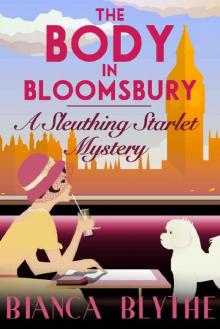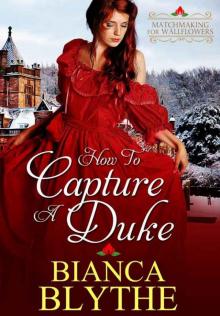- Home
- Bianca Blythe
How to Capture a Duke (Matchmaking for Wallflowers Book 1) Page 5
How to Capture a Duke (Matchmaking for Wallflowers Book 1) Read online
Page 5
“You have a destination in mind?” The man tilted his head toward her, his blue eyes probing hers, and she averted her gaze.
“Just continue North.”
“To?”
She paused. “I’ll guide you.”
No need to let him know their destination yet. Some things could be postponed. It would be better if he were to continue to feel uneasy around her. Because once he found out she was just a wealthy woman from the ton, there wasn’t a chance he would respect her. She would be labeled a foolish chit, and even though her issues meant everything to her, they would be dismissed. She shouldn’t be faulted for the narrowness of her world. She’d had no opportunity to join the war, to arrive home sullen and scarred like him.
She tapped her feet against the hot brick. She needed to ensure he did her this favor. At the very least, once they arrived at the castle, he wouldn’t be able to leave without her approval. These horses would be exhausted, and she could direct the servants to keep him there. The place was too isolated for him to wander away from it on foot, and he might find it simpler to consent to playing her fiancé for a few minutes.
“How did you injure yourself?”
He stiffened. “Doing something many would see as dutiful—battling Bonaparte’s army.”
“And the truth?”
The man sighed. “My cousin was doing something more dutiful. He fought an officer on the imposing side. The man was charging at me on a horse, waving a sword. It was my job to stop him. I was nearer, and yet my cousin stepped in front. He was killed, and I was maimed.”
“Oh.” Fiona’s heart stilled, and her throat dried. She understood the pain of death. She wrapped her arms around her chest and murmured, “I’m sorry. Truly.”
The trees thinned, and the handsome man’s gaze flickered over her. The horses continued their plod over the road. Before them some wassailers appeared. They were clad in simple clothes, and carried torches instead of lanterns to guide them as they went from home to home, singing.
He slowed the coach, and Fiona’s heart quickened. She redirected her knife at him. “Don’t stop. Or I’ll—I’ll—”
“You’ll stab me?” He raised his eyebrows. “I’ll take my chances. You’ve got witnesses before you.”
The horses slowed, and sweat prickled the back of Fiona’s neck. A throng of wassailers peered up at them.
“Happy Christmas,” a wassailer shouted.
“Happy Christmas to you,” the handsome man answered.
She lowered her knife, her mind grappling for something, anything to prevent this man from asking them for help.
His gaze flickered to her lap, and he smirked.
“I’m being kidnapped,” his voice boomed. “This woman has captured me. I need help.”
The wassailers stopped their song, and Fiona’s heart lurched. She forced herself to laugh. though the sound felt unnatural in her throat. “Darling, the things you say.”
The handsome man frowned. “I’m serious. She’s captured me! Help me! Please!”
“Sweetheart.” Fiona forced herself to smile and she slid her arm into his. Heat surged through her as her arm nestled into his.
She might be twenty-two, but this was the pinnacle of her contact with any man, and her heart galloped as she stared at the gathering of men and women before her.
The handsome man sucked in his breath sharply.
A round-faced woman chuckled, and others joined her. “That’s the most romantic thing I’ve ever heard. My dear husband, why don’t you say those things about me?”
A man beside her gave a sheepish grin.
“No, I’m serious,” the handsome man said. “I’ve been kidnapped.”
“By Cupid’s bow?” someone called out.
“No, no. By force!”
Laughter filled the air, and the scent of beer and cider wafted over the carriage.
“Perhaps we should sing you a song,” the round-faced woman said.
“How did you get that mail coach?” someone shouted.
The handsome man’s expression firmed. “Because—”
“Darling, let me drive.” Fiona snatched the reins from him and urged the horses past the wassailers.
“You shouldn’t have done that,” he grumbled.
“I’ll add it to the list of things you disapprove of.” She fumbled for her knife and handed the reins back to him.
They continued in silence.
Lights shone off the side of the road, directing travelers to the public houses. The man swiveled his head in the direction of an inn.
“Don’t even think about it!” Fiona said.
His eyebrows darted up. “A mind like mine can’t be dissuaded from thinking, no matter how eager you are to force on it your lack of education.”
She stiffened. “I suppose you went to Oxford.”
“No.” He stared firmly ahead.
“Cambridge?” The smooth sound of his voice and his consistently rounded vowels spoke Oxbridge to her.
His voice that would make him suitable to pose as her fiancé, until she saw fit to invent a suitable death for him. It was the voice of a man whom she automatically distrusted.
He pressed his lips together. “Edinburgh.”
“They do classics there, too?”
“I’ve got no patience for Latin, woman. Seems people already do enough talking when they’re just speaking their own language. Don’t need to add additional languages.”
Fiona snorted. “How educated of you. I suppose you have a degree in ignorance and close-mindedness?”
His lips jutted upward. “Medicine.”
Fiona’s eyes widened. People didn’t study medicine unless they were genuinely interested in it. “But you were an officer.”
“My family thought it more worthwhile for me to kill people than heal them.”
“I’m sorry.”
He shrugged. “I gave up that dream a long time ago.”
“Maybe now—” She paused, and her eyes fluttered to his leg.
“I’m rather occupied otherwise now. I . . . er . . . needed to take over my cousin’s business after his death.”
“You couldn’t be a doctor at the same time?”
He grinned. “That would be highly unconventional with my cousin’s business.”
“Which you’re not going to share with me?”
“No.” He shook his head, and his lips arched upward again. “Besides, doctors are rather supposed to be models of health. Not missing vital body parts.”
“I’m sure you didn’t intentionally—”
“Lose a leg? No, any struggle I have with disorganization is not that great.” A chuckle escaped from his lips.
Warmth filled Fiona, and she settled back into the carriage chair. For a moment she might even imagine that the man was really her fiancé, and that they weren’t hauling a large, awkward coach, but were in a curricle. The scent of pine would fill the air in just the same way, and the rumble of the man’s voice beside her would be a comfort to her instead of a reminder she had to be on guard.
If the magistrate found she’d captured a man . . . Fiona didn’t want to contemplate the legal consequences. It was enough to imagine how the action would fuel the ton‘s gossip, humiliate Grandmother, and confirm all of Madeline’s worst suspicions of her.
She’d thrown her reputation away. With one impulsive move, she’d hurried this man, who bore scars from the war, into a carriage despite all his protestations. She’d frightened his driver, and once that man managed to secure help, she’d have the wrath of the royal mail to answer to.
Nice ladies didn’t capture men. Nice ladies didn’t pretend to be ferocious highwaywomen. Even improper ladies didn’t do this—at absolute worst they might permit a rogue to bed them, an experience that did not likely have the rogue cowering with fear.
Her fingers scrunched together, tightening further around the edge of the blade. If this ever got out, and if they didn’t get off the road soon, some authority was likely t
o find them. Then she would never be able to marry, never be able to have anything similar to a normal life. Even her sister would be subject to the tittering of gossip-mongers.
And though she’d long told herself she had no intention of ever marrying, the idea that she’d virtually guaranteed herself society’s contempt, that she might actually find herself ushered off to a prison cell for a while, caused her heart to shudder.
The man had been brutally injured in the war. He didn’t deserve this. No one deserved this. And yet she couldn’t do anything except continue to drive forward. She couldn’t go to the magistrate and confess. Not when word might reach Grandmother of her actions. And not when being a highwaywoman was a capital crime. Her chest tightened.
“And do you have a name?” she found herself asking.
“Not for you.”
“Then I’ll call you Percival.”
He swung his head over to her, and his mouth gaped open.
“Your forename was on your valise.” She faltered under the magnitude of his startled gaze. “Though it speaks of an informality I’m uncomfortable with.”
“I think we left formalities behind a long time ago,” he mused, but his voice sounded hoarser than before.
Chapter Seven
Percival clenched his fingers around the reins. She knew his name. By Zeus, maybe she knew about the jewels. Maybe she knew he’d recently inherited a bloody dukedom. Maybe this whole thing was planned in advance, and he was merrily driving himself to some kidnapper’s lair, to the sound of jingling Christmas bells, where he’d wait until the dowager duchess might wrangle up appropriate amounts of money to appease the criminals.
He squeezed his fingers against the leather reins. The now-familiar pain surged through him, and he fought the urge to massage the wound.
The carriage wheels clattered, and the lantern swerved ahead, throwing dim light over the narrow lane. On occasion a fox scrambled from the road toward the tall hedges that soared on either side. He wondered what local gentry lived here and if he might guide the coach to a destination that differed from the one of the highwaywoman’s choice.
What desperation had driven her to this life?
He needed to make an escape. No one needed to know that the new Duke of Alfriston was so incapable that he’d managed to get himself kidnapped mere months after taking on the dukedom. But Zeus—she knew his name.
He’d already revealed more to this nefarious-minded stranger than he did to most others. He’d never suffered from chattering too much before. Quite the opposite, if his conversations with the women of the ton were any indication. But he’d never quite succeeded in feigning an interest in flowers and dresses, and they’d never quite followed his conversations about war.
In previous years he’d seen the slight, but definite wrinkles of their noses when he’d mentioned that he was the wrong Carmichael, and their eager excuses when he’d revealed that an actual duke, his cousin Bernard, was nearby. Percival’s brother Arthur was the fun Carmichael, the one who effortlessly earned himself the reputation of rogue, and his cousin had been the sensible one with the title and the vast estate. He had two sisters as well, Louisa and Irene, though thankfully neither had debuted yet. Their parents indulged their own interest in travel, and it was seldom they were not flitting off somewhere in the world.
He sighed. Bernard wasn’t here anymore. The man’s last breath had been swallowed on the fields of Waterloo, his last action saving his cousin, instead of himself, from the French.
If his older cousin had only married. If only he had not been heroic and sailed to France. If he’d had children, particularly of the masculine variety, Percival would not be under this pressure now, and the dowager would be able to look forward to the good characteristics of her son continuing the line. Percival’s youthful desire to become a physician did not endear him to her, and she’d made it plain she thought him untrained and ill-bred for the momentous task of managing the enormous Alfriston estates, sprinkled from Sussex to Yorkshire.
What could he do besides strive to be the best duke he could be? His cousin had died trying to save him. Appeasing the man’s mother was the least he could do.
The woman’s scent drifted over him, warm strands of vanilla mixed with amber and berries. It seemed more complex, more mature than the perfumes crammed with roses and musk he was accustomed to.
He let his gaze return to her. She hadn’t complained once of discomfort. Occasionally her lips contracted as if attempting to prevent a yawn from escaping.
His lips turned upward despite himself.
She would almost amuse him, if he could ignore the fact that she was an outlaw.
His stomach hardened. He shouldn’t be seeing good qualities in her. She was a professional. A woman of the very worst sort.
Stopping a coach. Letting the rest of her dastardly band linger in the woods. Yes, she was definitely a professional. He was sure most thieves would want to work up to that point, conscious of the many things that could go wrong.
Likely this woman had already experienced all of them.
By Zeus, perhaps she had even killed people.
He shivered and turned to her. “So do you have a name? Or do you just go by Miss Demon?”
She chuckled, but then shifted her legs. “I’ll tell you soon. I promise. Or I won’t. It depends—”
“On if you get caught first?”
She nodded.
Did the woman mean to kill him after all? Tell him her name to appease some sort of dying wish, after whatever criminals she consorted with robbed him? He didn’t want to speculate on why it would be bad for him to learn her name before the trip, and why it would be fine for him to learn it after.
He scanned the horizon, but no ruffian popped out and no horse galloped toward him, carrying a criminal branding a rifle. His skin prickled, not entirely because of the cold weather.
By summer he would be happy and settled, even if he wasn’t a doctor, even if that particular dream hadn’t come true. He’d be enjoying all that everlasting love and such. Lady Cordelia—she was it. One didn’t need to meet her to know it.
He patted the inside fold of his great coat where he’d hidden the jewels for his future fiancée, and then hastily removed his hand. He glanced at the Scarlet Demon. Her eyes met his, but she remained as before, staring straight in front of her, observing as the coach passed underneath bare branches.
Likely this would all be pretty in the summer, but now snow sat on the branches instead of leaves and flowers, and he’d seen scarcely any animals.
By Zeus, what was he thinking about? Musing about flowers and leaves, like some penniless poet. Though even they had a propensity to wander the countryside, while he was confined to a blasted coach.
“Your great coat. What’s in it?” the woman murmured to him.
She had noticed.
“Nothing.” He averted his gaze. He told his heart to stop its frantic rhythm of thumps, and he told his breath that it needn’t quicken as if he had a cannon trapped in his body.
But he also saw the knife, which was directed far too near him.
He heaved a sigh. “Put that down.”
“No.”
“It’s dangerous.” By Zeus, I don’t have time for this.
“It’s supposed to be.”
“What do you want?”
“What are you hiding?”
“Nothing of your concern.” He sucked in a deep breath of air. “It’s not money.”
“Indeed.”
“Anyway, aren’t you supposed to be able to get money easily? What with being a thief and everything? You probably have a stack of coins down your boots.” He peered down at them. They were worn, but the leather did not seem completely lacking in quality. He shook his head. He’d never met a highwaywoman before, and it was natural for her to not entirely fulfill his expectations.
“You’re asking me to steal?”
“No! Though you needn’t act so appalled. It is your profession.”
<
br /> “Then why don’t you go around shooting people?” She huffed beside him. “Isn’t that your profession?”
“If his Majesty’s Army wanted me to do so . . .”
“Well I don’t steal on whim either.” She paused. “Unless the head smuggler asked me to do so. I mean, then I can be exceedingly effective.”
“Right.”
She lowered her voice, and a trace of a French accent sounded. “You wouldn’t want to meet me on an abandoned road.”
He sighed. “I already have. And I’m being dragged in the opposite direction of my destination.”
Far away from London and the ton and the Christmas ball that would mark the start of his new life. He’d made appearances in London since his accident, but now Lady Cordelia, the woman who would have married his cousin, was there. He’d have her by his side, and everything would be different.
He wasn’t sure this ride was all that much worse than London would be.
The thought was ridiculous. His new life promised brilliance. That’s why he hadn’t been spending his time dreaming about it while at war. It wasn’t that his new life wasn’t something he wanted—it was just that it was better than anything he ever could have imagined.
That was all.
Another carriage approached them with an actual gold crest and brightly painted wheels.
“Oh dear Lord.” The red-headed woman ducked her head down.
“You’re reaching to religion now?” He tilted his head. “The first thing you could do is release me. I’m sure the Lord would approve.”
“Not funny.” She gritted her teeth. “Just continue driving. More quickly.”
He furrowed his brows and swung his head back toward the departing carriage.
“Don’t look!” The woman squealed. “That might draw attention.”
“So would a woman pushing her head down. They might suspect—” He grinned, for one second allowing himself to envision just what the other people might be thinking.

 The Earl's Christmas Consultant
The Earl's Christmas Consultant A Holiday Proposal (Wedding Trouble Book 6)
A Holiday Proposal (Wedding Trouble Book 6) The Earl's Christmas Consultant (Wedding Trouble Book 3)
The Earl's Christmas Consultant (Wedding Trouble Book 3) A Kiss for the Marquess (Wedding Trouble Book 5)
A Kiss for the Marquess (Wedding Trouble Book 5) My Favorite Duke (The Duke Hunters Club Book 2)
My Favorite Duke (The Duke Hunters Club Book 2) The Sleuthing Starlet Mysteries
The Sleuthing Starlet Mysteries Lords, Snow and Mistletoe
Lords, Snow and Mistletoe The Body in Bloomsbury
The Body in Bloomsbury How to Capture a Duke (Matchmaking for Wallflowers Book 1)
How to Capture a Duke (Matchmaking for Wallflowers Book 1) Don't Tie the Knot
Don't Tie the Knot Dukes Prefer Bluestockings
Dukes Prefer Bluestockings A Marquess for Convenience (Matchmaking for Wallflowers Book 5)
A Marquess for Convenience (Matchmaking for Wallflowers Book 5) Lords, Snow and Mistletoe: A Regency Christmas Collection
Lords, Snow and Mistletoe: A Regency Christmas Collection Don't Tie the Knot (Wedding Trouble Book 1)
Don't Tie the Knot (Wedding Trouble Book 1) The Perfect Fiancé (Matchmaking for Wallflowers Book 0)
The Perfect Fiancé (Matchmaking for Wallflowers Book 0) A Rogue to Avoid (Matchmaking for Wallflowers Book 2)
A Rogue to Avoid (Matchmaking for Wallflowers Book 2) Mad About The Baron (Matchmaking for Wallflowers Book 4)
Mad About The Baron (Matchmaking for Wallflowers Book 4)